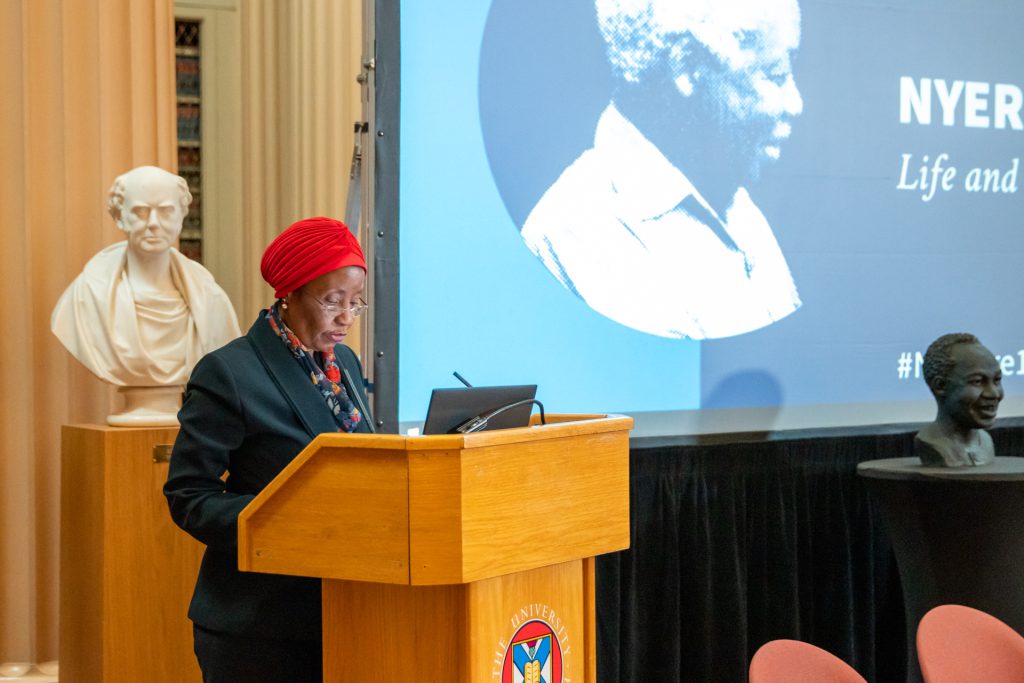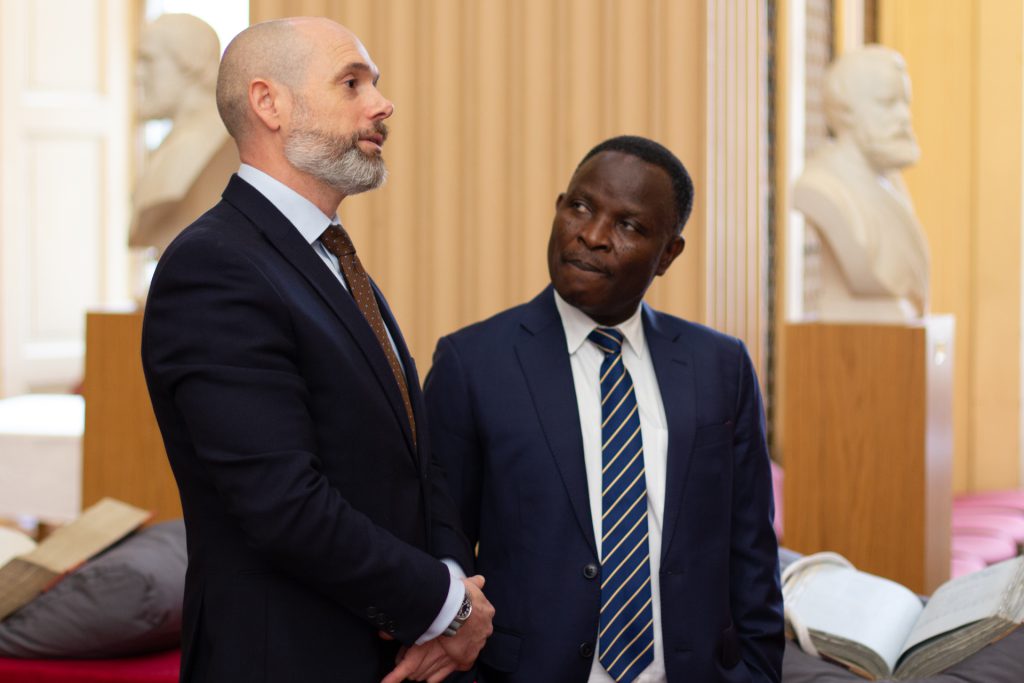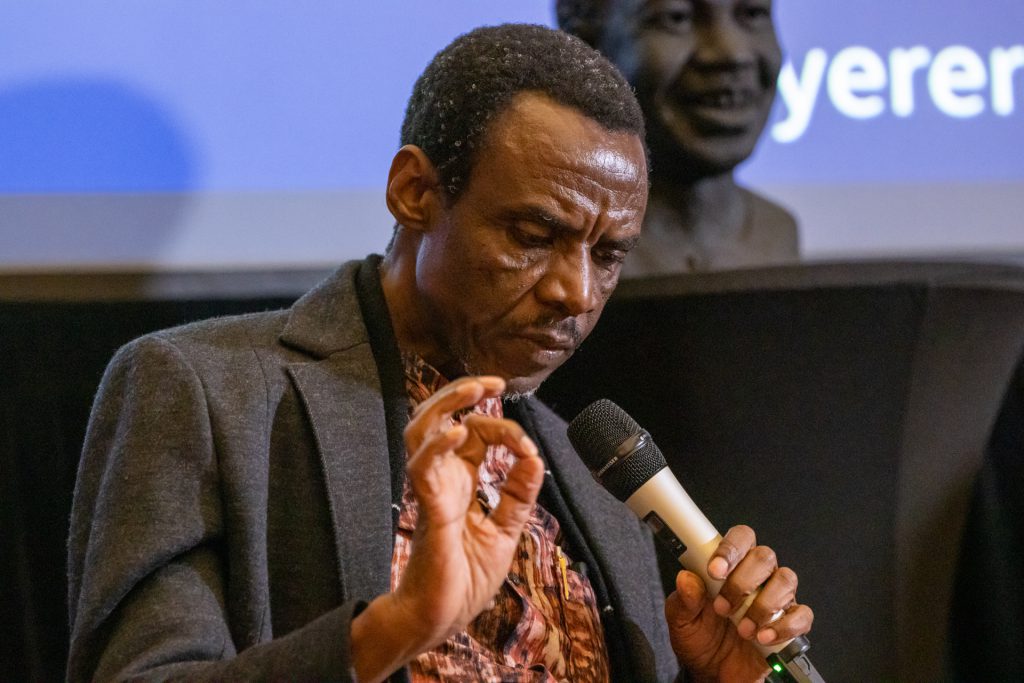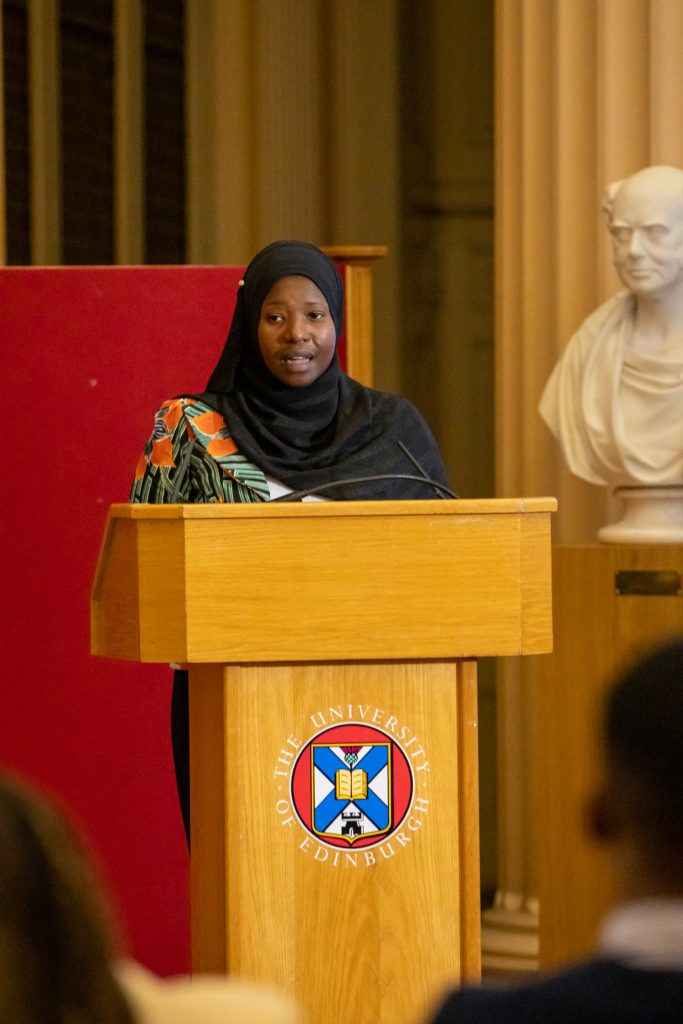Shimbo Pastory
This article was published in The Citizen Newspaper – Tanzania on 12th November, 2022.
On November 7, in the Playfair Library of the University of Edinburgh – Scotland, the Centre of African Studies at the School of Social and Political Science at the University of Edinburgh hosted a crowd of Tanzanians and friends of Tanzania in commemoration of Mwalimu Nyerere’s centenary. It has been 100 years since Mwalimu was born in 1922. Though there have been centenary events at home, it is such an honour to see his good work being remembered and treasured abroad.
The centenary took a form of a thoughtful yet less-formal symposium – something that Mwalimu would have liked. Academics and Nyerere enthusiasts from various learning institutions graced the occasion with their informative presentations. Attendants were also privileged to see the original records of Mwalimu at his Alma Mater in his fine handwriting.

A taste of Nyerere’s life
In her opening address, the High Commissioner of Tanzania to the United Kingdom, Her Excellency Dr Asha-Rose Migiro expressed that common feeling shared by many Tanzanians.
She highlighted how Mwalimu Julius Kambarage Nyerere’s admiration goes beyond his being the founding father of our nation. He was a great pan-Africanist, a unifier force for Tanzanians and other African nations, and exemplary in political skills, hard work, zeal for progress, knowledge, freedom, unity and human empowerment.
“Mwalimu became his title of respect, and at some point, it could not be separated from who he was. He was simply referred to as Mwalimu. Even today when someone says Mwalimu it immediately suggests Julius Kambarage Nyerere. He was a teacher for his country, teaching his people good agricultural practices as well as good use of language and Swahili grammar,” Dr Migiro said.

Speaking about Nyerere’s legacy, Her Excellency Dr Migiro acknowledged the transformative power of Nyerere’s thoughts on freedom, dignity and respect for all peoples. The unity of Tanzanians today and the absence of tribal and religious divisions is a testimony of the strong foundations Mwalimu Nyerere laid. Kiswahili which has been a language so dear to Tanzanians only became so because of his effort.
With the unique nature of this centenary event, Her Excellency Dr Migiro commended the University of Edinburgh for the initiative and hard work towards making this memorial event a success.
Nyerere’s Thirst to Be Useful
As records will have it, Nyerere was accepted for entry at Edinburgh University in October 1949. In choosing his master’s degree, Nyerere wrote in his letter “If I can be useful to my country after my studies here, I will be more useful if I take arts rather than a science degree.” In this, we see a patriot with a desire to go back home and bring change.
Dr Thomas Molony who is currently a senior lecturer at the Institute of African Studies at the University of Edinburgh worked blood, sweat and tears for years in researching the early years of Mwalimu Nyerere, a task which occasioned him many long stays in Tanzania. He is the author of the book “Nyerere: The Early Years.”

Dr Molony gave a historical presentation of Nyerere’s unfolding through his life journey, from the chieftaincy family in Butiama, moving on to Tabora Boys, Makerere University, until he went to Edinburgh University for further studies. Nyerere’s political and leadership aspirations were promising ever since his early adulthood.
The Unfinished African Liberation Agenda
Dr Ng’wanza Kamata who is one of Nyerere’s Biographers currently teaching at the University of Dar es Salaam spoke in depth about Nyerere’s involvement in the liberation of many African Nations, with South Africa being the last in 1994.
Nyerere was concerned about colonialism, capitalism, and the race question, which was particularly broader in neighbouring nations. Dr Kamata unveiled that Nyerere knew that Africa was still under the threat of being dominated even after colonialism was dealt with.
Independence was not enough and decolonization was a deeper problem than it appeared to be. It was a later realization that what people fought for was not going to work until the structure left by colonial masters is dealt with because, with the same structures, African leaders inherited both positions of power and their unjust privileges.
Dr Kamata observes that colonial powers are still in indirect control of the majority of African economies. Colonialism which was a system of exploitation did not end all of a sudden after the formalities of independence.

Mwalimu Nyerere being at the helm of the think-tank for the young nation, categorised liberation that we needed into four.
First, freedom from external economic domination; second, not giving chance to rule to the minority; third, freedom from poverty, injustice and oppression imposed by Africans on fellow Africans; and fourth, mental freedom, that is the ability of Africans to think of themselves as intellectually capable, and not inferior as compared to Non-Africans.
Dr Kamata opined that with exception of the first, the other three aspects are still very relevant today.
“While external economic domination cannot be denied, Africa can only be free by cutting off the tentacles of imperial nations. De-linking will mean revising and refining the terms of engagement, changing structures of our economies such that they are internally articulated,” Dr Kamata expounded.
Mwalimu placed African unity at the heart of its liberation, a thought whose legitimacy time has revealed.
Nyerere’s Legacy in Leadership
Deborah Bryceson is a professor of African studies and an honorary fellow at the Centre for African Studies at the University of Edinburgh. In her presentation, she made a comparison in qualities of good and exemplary leadership among several African leaders who were Nyerere’s contemporaries.
Akin to Seretse Khama of Botswana, Mwalimu Nyerere proved to be outstanding in his leadership and effort towards economic growth and the national sovereignty of the newly independent nation.
Nyerere’s abolition of civic, administrative and juridical powers in chieftaincies and chiefdoms was an act of courage as he came from a family of a chief himself. But he did so for the greater good, to bring in a balanced system that functions with the contribution of everyone.
Nyerere’s Inclusion and Women Empowerment
Zamda Geuza is a Tanzanian doctoral researcher at the University of Exeter, with a background in communication and publishing. In her presentation, she expounded on the less-known reality of the inclusion of women in government and leadership which was the bedrock for the progress presently made.
Mwalimu’s unpublished manuscript of 1944 which was in 2009 published in the book ‘Uhuru wa Wanawake’ by Mwalimu Nyerere Foundation, clearly admits to the presence of oppressive social structures and advocates for the inclusion of women in legal systems and leadership. The involvement of women brought about productivity and financial independence.

Mwalimu also established strategies like Universal Primary Education, Adult Education, Literacy Campaigns, and Functional Literacy which helped to give access to education to those who were denied educational opportunities because of cultural reasons, early marriages and early pregnancies.
These empowerment strategies contributed to promoting interest in literacy and literature among women, giving birth to educated African women, including writers and publishers.
Seeing the potential in this empowerment, Ms Geuza emphasized the need to invest in promoting readership and literacy through training and supply of books among girls and women, and collaborative involvement of women in empowerment projects.
The youth and their understanding of Nyerere
Mr Albert Mkony is a Tanzanian and senior tutor and researcher at the University of Edinburgh. In his presentation, Mr Mkony elaborated on the knowledge gap across generations as regards Mwalimu Nyerere. With 70% of Tanzanians today being born after his leadership, there is a spectrum of opinions regarding him based on age, experience and levels of informedness.
With very few engineers, medical doctors, and other professionals, Mwalimu’s generation built the country. This is probably where the usage of the phrase “kujenga nchi” as a reference to ‘going to work’ finds its best context. Mr Mkony is of the view that there is not enough Nyerere education among young Tanzanians.
Mwalimu Nyerere in Education
In his address, Prof. William Anangisye who is the Vice Chancellor of the University of Dar es Salaam and an alumnus of the University of Edinburgh expressed his profound gratitude to the University of Edinburgh for such a befitting commemoration of Mwalimu Nyerere.
He highlighted Mwalimu’s contribution to Tanzanian education, and in founding the University of Dar es Salaam which has evolved to be a reliable and reputable academic and research institution in Tanzania, the continent of Africa, and the world.
“Mwalimu Nyerere’s influence is immense and endless. He was primarily concerned about relevant education for people at all levels. For him, the purpose of education is to increase people the power to govern themselves and master their environment. For Mwalimu Nyerere, ignorance, poverty and diseases were enemies to be tackled, that was why he worked to build an education system whereby knowledge is not just given in Africa, but given to Africans to address the needs in Africa and transform the lives of people from low levels of poverty.” Prof Anangisye elaborated.
The University of Dar es Salaam has renamed its main campus with Mwalimu Nyerere’s name as its token of appreciation for the footprints of good work he left behind.
The Rector of Edinburgh University, Deborah Kayembe, a daughter of the African Continent from DR Congo, an outstanding lawyer and human rights activist, and the first African to have her portrait erected on the wall of the Royal Society of Edinburgh, gave a vote of thanks to H.E. Dr Migiro and all who attended. In her words said in Swahili, “Nyerere will be remembered as a precious gift to the world.”
A bilingual (Swahili and English) poem by a Tanzanian poet Pepita Mwanga was a rich tribute to Mwalimu and informative entertainment for the day.
NB. The poem was not published in the Newspaper version of the article.
“Mwalimu, Happy 100th” – by Pepita Mwanga
Mwalimu Julius Nyerere, A Leader,
He led one by one,
A group, an organization, on a mission, For independence and unity,

With a sword of the tongue, And action at hand,
With wisdom and wit,
And the heart of a patriot,
He extended the arm of the nation, To pull peoples from war to liberation,
And together we climbed up and lit up, The everlasting fire of the torch,
That crosses borders,
Igniting hope,
Where there’s no hope,
Cultivating a love, To swallow hatred, Bringing respect,
Where there’s contempt.
Father of the nation,
Who brought together the scattered children,
Under one roof,
Woven in the fabric of Swahili,
Strangers became kin,
Love overshadowed enmity, Borders became bridges,
As we helped with each other’s needs,
As we helped each other to break free from colonial chains,
One chain link in the mind another in the heart,
And another in our resources, An act never-ending.
Honorable, dignitary, eminence, And many a designation,
But with humility and wisdom,
He chose “mwalimu”, the teacher,
And with intelligence, He fought for education, Not just for his own,
But for everyone’s sake,
He bequeathed us a democracy, A system with the intention,
Of liberation,
Only if we liberate democracy.
© Pepita Mwanga, 2022 – Edinburgh, Scotland – UK.